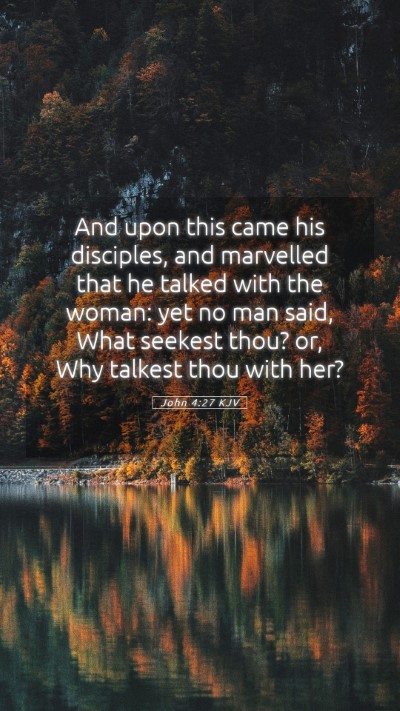Understanding John 4:27
In John 4:27, we find a moment rich in meaning and significance, particularly in the context of Jesus' interaction with the Samaritan woman at the well. The verse states, "And at this point his disciples came, and they marveled that he talked with a woman; yet no one said, 'What do you seek?' or, 'Why are you talking with her?'" This passage provides a profound insight into cultural norms, the breaking of social barriers, and the central message of the Gospel.
Verse Analysis and Commentary
The scene described in John 4:27 is pivotal for several reasons:
- Disciples' Surprise: The disciples were astonished to find Jesus speaking with a woman, particularly a Samaritan. In Jewish culture, this was deemed highly inappropriate, showcasing the deep-rooted prejudices and cultural restraints of the time. Matthew Henry notes that their marveling highlights the societal norms that Jesus defied.
- Breach of Cultural Norms: Albert Barnes emphasizes that Jesus' willingness to engage with the woman illustrates His mission to break down barriers, both racial and gender-related. This interaction signifies the inclusive nature of Christ's message, welcoming those marginalized by society.
- Unasked Questions: The disciples did not question Jesus about His intentions in speaking to her, which Adam Clarke interprets as an indication of their confusion and perhaps their hesitation to challenge the Lord directly. This response reflects the struggle between their cultural upbringing and the transformative message of Christ.
- Significance of the Encounter: This moment serves as a powerful reminder that Jesus came to seek and save the lost, embodied in His conversation with the Samaritan woman. His actions challenge preconceived ideas about who is worthy of God’s attention and grace.
Application of the Verse
For modern readers, John 4:27 serves as an invitation to reflect on our own biases and the ways we may unconsciously uphold barriers in our communities. The verse encourages humility and openness in extending grace to others, regardless of their background.
- Encouragement for Inclusivity: Engage with those who are different, reflecting on how Jesus transcended cultural boundaries.
- Awareness of Social Norms: Challenge societal norms that limit interpersonal relationships and outreach efforts within communities.
- Evangelism Dynamics: Consider how Jesus’ approach can inform our methods of sharing the Gospel, focusing on loving and understanding rather than judging.
Cross References
This verse connects with several other Scriptures that highlight Jesus' inclusive ministry:
- Luke 7:36-50: The story of the anointing woman, which emphasizes forgiveness and acceptance.
- Mark 2:15-17: Jesus dining with tax collectors and sinners demonstrates His mission to reach the outcast.
- Galatians 3:28: A declaration that in Christ, there is neither Jew nor Gentile, affirming the equality of all believers.
In conclusion, John 4:27 encapsulates profound Bible verse meanings that resonate through time, encouraging believers to reflect on their understanding of grace and the mission of Christ. The implications of this passage extend into areas of biblical exegesis and scripture analysis. As we delve deeper into Bible study insights and engage in online Bible study, we must embrace the challenges presented in this text and apply its truths in our daily lives.


